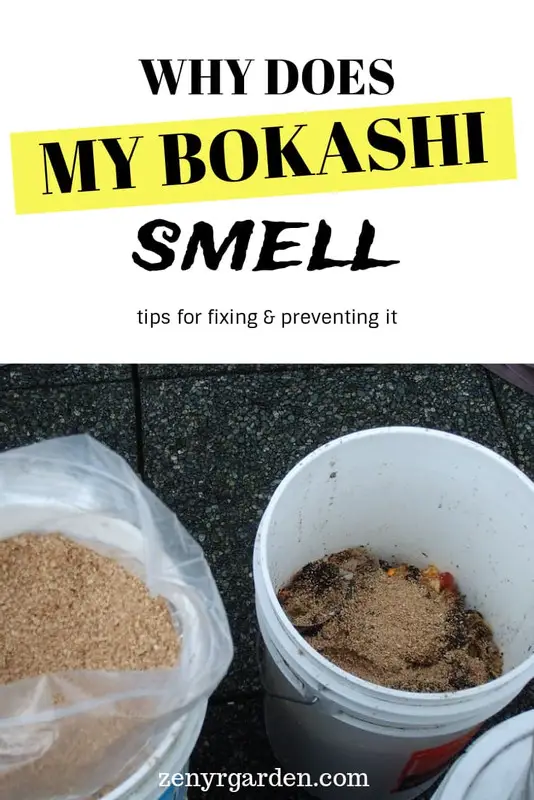In some bokashi bucket, if the lid is not put on tight then it may cause a foul smell. Other issues with the moisture, the heat or temperature may make the bokashi go bad. Let's see some ideas why & how to fix it now.
The Causes of Bad-Smelling Bokashi
#1. The Air
If your bokashi is giving off quite a bad smell, check if the lid is put on tightly. With bokashi we're going into an anaerobic mode, so we want little or no air/oxygen to get in. See also if the container is air-tight. Any leakage holes around it may cause the air to get in.
Also, remember to check:
#2. The Moisture Level
Have you checked that there's some juice collecting at the bottom of the bin?
Remember to drain it out every 2-3 days or when it starts to fill up more. Letting the liquid sit there may increase the wetness & humidity, which can make the contents smell bad.
We'd also want to separate out the solids from the liquid. So use a screen, a garbage bag liner or some separator with holes so the food waste don't sit directly in the liquid.
#3. The Bokashi Itself
The bacteria in the bokashi is the key to this process so make sure that they are healthy, active & alive. If you make your own bokashi, use good materials so the bacteria turn out well. Sometimes, after many multiplications the fourth & the fifth generation of bacteria may not be as strong & vigorous as the parent generation.
Be sure to use enough bokashi to decompose the hard-core stuff like meat, bones, diary or any high-protein foods. Too hot a temperature may kill the microbes as well as too cold. If you store your bokashi, refrigerate them at around 5-10C (41-50F) for best chances of microbe survival.
In one occasion, we used bokashi that has been exposed to air. It did not leave a bad smell but more of a weird smell of acetone. So now we're more careful of putting good bokashi in.
#4. The Food Waste
It is okay to add one or two slices moldy bread to the bokashi. If your good microbes outnumber the fungi, then this should be no big deal for them.
If you add too much spoiled foods, then the bokashi themselves may not be in a good position to fight the bad guys. Then, when they take over, the batch may go bad & smell bad.
Anything but white mold means the bokashi might have gone bad. It may give off a slight ammonia smell as well. The ammonia may also suggest excess protein in the batch.
You could try to layer the food waste & the bokashi so they get mixed in well with each other. For about 3-4 inches of food, sprinkle in some bokashi grains or put in a round paper soaked with good microbes. You can do this layer by layer up near the top. It's better to be generous with the bokashi sprinkling.
#5. The Temperature
Be sure not to expose your bokashi batch to direct sunlight. The UV rays can kill off the bacteria, leaving open ground for the bad microbes to roam. Also, don't transfer the bucket to places with extreme temperatures too often.
Around the 50s F (10C) is okay for them to go into sleeping mode. Below that may freeze them to death. If it's winter, get the bucket inside in a warm spot. In the summer, find a dark cooler place like in your basement to keep the bucket.
But what if your bokashi has gone bad & disgusting?
Rest assured, here are some good ways to deal with it:
What to Do With Spoiled Bokashi
With the spoiled, disgusting-smelling bokashi you don't have to throw them away. We can still utilize them.
#1. Use For Your Backyard
If you have some space in the backyard, dig a hole about 1ft (30 cm) deep a little further away from any near-by trees.
Then, layer about 1/2 lbs (220 gr) of good fresh bokashi at the bottom. Then, dump the spoiled batch in. Top it up with another 1/2 lbs (220 gr) layer of fresh bokashi. Finally, cover the whole thing with a layer of soil.
The layer looks a little bit like this:
| Layering spoiled bokashi in the backyard |
|---|
| Top soil |
| Fresh bokashi |
| Spoiled batch |
| Fresh bokashi |
In the summer, this stuff would take about 2 weeks to break down. In the winter, it can take up to a month.
When it's done composting, you can use that area to plant flowers & veggies like you normally would with other good compost. The spoiled bokashi would have now turned into good compost that adds back nutrients to your garden soil.
The second way we can deal with bad, foul-smelling bokashi is:
#2. Use In Plant Containers
You can also handle this spoiled bokashi content in a container. In a 10-gallon (or two 5-gallon) planters, put in a bottom layer of soil. Then sprinkle some good handfuls of good bokashi on top of that. Pour the spoiled contents of your bokashi in. Top it up with some good bokashi.
Then, close the lid tight. You can take this out on the balcony or somewhere distant from your living spaces. Then, in about 2-4 weeks, it will decompose like it normally would. The smell will also disappear. You'll then have good, nutrient-rich compost to plant your flowers & veggies.
But what about the liquid that we juice out? What can we do with it?
If you're curious, let's quickly see that part next:
What to Do With the Bokashi Liquid
The drained leachate from the bokashi can be used as a compost tea for your garden. It is best to use it the same day you drain it out. An amount about 1 tsp per gallon of water will be fine. Or in metrics, it's 5 ml per about 5 liters.
But if liquid smells bad, the quickest way that many of us do is to dump it off the drainage system. If you have some bokashi left, throw them in the liquid. It will help eliminate the odor & purify the water. We can then use the liquid again.
The concentrated juice is also good for unclogging toilets as well.
After going through this experience, many people ask:
What does bokashi smell like?
A well-done bokashi compost smells like pickles or that sour smell of fermented foods.
And with that, hope you will:
Have a Great Bokashi Making
Now you know some reasons why a bokashi batch may go bad, stay away from these troubled points & you'll be set for a great, nutrient-rich compost.
Even if the contents have gone bad, you'll still have a fall-back plan to know what to do with it. Good luck & have lots of great compost bokashi-ing.
Other bokashi posts you may find interesting:
Share or pin this post!


